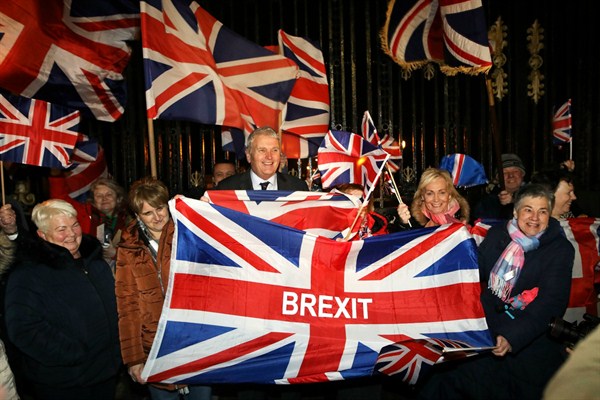BELFAST, Northern Ireland—The two main political parties in Northern Ireland announced a deal last month to restore the region’s power-sharing government, which had ceased to function three years ago. Within 24 hours of the announcement of the deal on Jan. 10, which was brokered by the British and Irish governments, Northern Ireland’s institutions of devolved government were back up and running. Yet while many in Belfast are breathing a sigh of relief, British Prime Minister Boris Johnson’s recent Brexit deal has created a host of new problems for the region that the reopened Northern Ireland Assembly will need to confront.
After years of deadlock, the catalyst for the recent accord was the U.K. general election in December. Both the Irish nationalist Sinn Fein and the pro-British Democratic Unionist Party, or DUP, suffered significant losses at the hands of voters frustrated by their unwillingness to compromise. If they did not find common ground, they faced the prospect of new regional polls for the Northern Ireland Assembly to break the stalemate. Rather than fight another election where they were likely to see further losses, they agreed to compromise on key issues that had bitterly divided them in the past.
Chief among these was Sinn Fein’s insistence on legislation to promote and protect the Irish language, which the DUP has strongly opposed. It believed Sinn Fein was trying to achieve by political means what its paramilitary counterparts in the Irish Republican Army had failed to achieve through years of violence: to destroy the “Britishness” of Northern Ireland. While the DUP’s concern may seem alarmist to outsiders, the idea of the Irish language achieving equal status alongside English is powerfully symbolic. Predominantly Catholic nationalists, many of whom speak Irish or at least wish to protect the language as part of their cultural identity, were previously a minority in Northern Ireland. Now, they occupy a majority in many areas, and are approaching parity in numbers even in historically Protestant-dominated Belfast. Unionists fear that official recognition of the Irish language would further strengthen nationalists’ ambitions to eventually realize a united Ireland.

